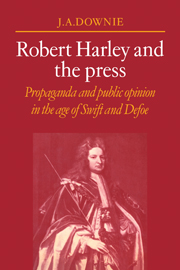Preface and Acknowledgements
Published online by Cambridge University Press: 07 October 2011
Summary
After the freedom enjoyed by the press on the outbreak of civil war in 1642, the Restoration reimposed censorship with the licensing act of 1662. Until the Glorious Revolution, with one short lapse from 1679 to 1685 (when Charles II attempted to control the press through the exercise of his prerogative), the publication of political literature was regulated by law. Each pamphlet and newspaper had to be licensed by authority, and without this seal of approval it was liable to prosecution. The abandonment of the licensing system in 1695, however, did not inevitably mean that the press had been accepted by government. For Macaulay the rise of a free press was of more importance than the signing of Magna Carta, or the acceptance by William and Mary of the bill of rights. But the end of censorship was due to the fundamental inefficiency with which the licensing system had operated, not to a more enlightened attitude. The press had still to win its freedom, although it had escaped for a time the shackles of restriction.
In the course of the eighteenth century the political press gradually became a permanent feature of English society. Alongside the whims of monarchs, and the decisions of parliaments, there grew up a further power in the state: public opinion. The years after 1695– the age of men like Swift and Defoe – were crucial in this development.
- Type
- Chapter
- Information
- Robert Harley and the PressPropaganda and Public Opinion in the Age of Swift and Defoe, pp. ix - xiPublisher: Cambridge University PressPrint publication year: 1979



